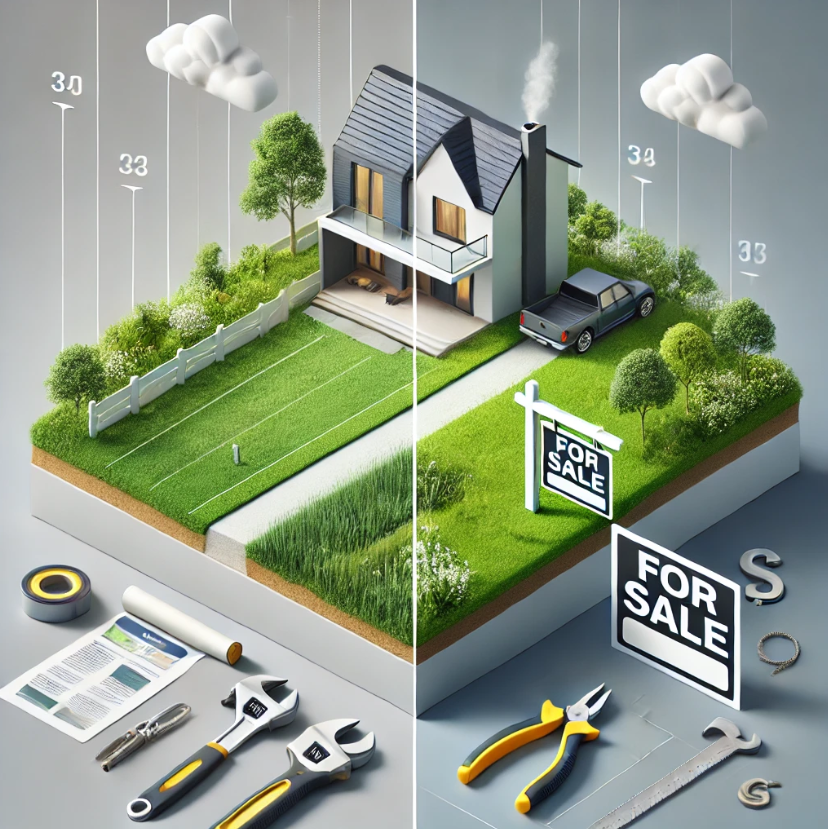The Hidden Costs of Owning a Home vs. Buying Land: What No One Tells You
Dec. 10, 2024

When it comes to real estate, the classic debate between buying a home and purchasing land is one that many potential investors face. While owning a house may seem like the obvious choice, there are hidden costs that can tip the scales in favor of buying land instead. This article will explore the less obvious financial implications of both options, offering a fresh perspective on which investment might be best for you.
1. Upfront Costs: House vs. Land
Buying a home typically requires a larger upfront investment. There’s the down payment, closing costs, and the potential for immediate repairs or renovations. On the other hand, purchasing land usually comes with significantly lower upfront expenses. While you may still encounter fees for zoning, inspections, and legal paperwork, these costs are generally lower compared to the costs of closing on a house.
Example: A $150,000 home might require a $30,000 down payment (20%), while a $30,000 piece of land may only require a 10% down payment — a significantly smaller initial investment.
2. Maintenance and Repair Costs
A house requires ongoing maintenance, from roof repairs to HVAC system replacements. Homeowners must also factor in regular wear-and-tear costs, like repainting walls or replacing flooring. Land, on the other hand, typically requires minimal maintenance unless it’s being actively developed or farmed. This makes land a "set-it-and-forget-it" investment in many cases.
Example: The average homeowner in the U.S. spends 1-4% of the home’s value annually on maintenance. For a $250,000 home, that’s $2,500 to $10,000 each year. Compare that to an undeveloped plot of land, which might only require occasional landscaping or weed control.
3. Property Taxes and Insurance
Property taxes for a home are based on the value of both the structure and the land it sits on. Because houses are more valuable than empty lots, property taxes on homes are significantly higher. Land taxes, by contrast, are based on the value of the land alone, which is often much lower. Additionally, homeowners must pay for homeowners insurance, which protects against damages from natural disasters, theft, and more. If you own vacant land, insurance may only be necessary if you plan to build or if there’s a liability risk.
Example: Homeowners insurance for a $250,000 home can cost anywhere from $1,200 to $1,500 annually. Vacant land insurance is optional and far less expensive — typically less than $200 per year.
4. Flexibility and Customization
Owning a home locks you into a specific layout, location, and design. While renovations are possible, they can be expensive and time-consuming. With land, you have complete freedom to design and build your ideal structure from the ground up, whether it's a custom home, a rental unit, or a commercial project.
Pro Tip: Buying land first gives you time to design your dream home while potentially benefiting from land appreciation in the meantime.
5. Investment Potential and Resale Value
Land has unique investment potential because it’s a finite resource — they’re not "making more of it." While home values can fluctuate with the housing market, raw land can appreciate significantly if development moves into the area. Investors who purchase land in "up-and-coming" locations can see returns of 100% or more over several years.
Example: A plot of land purchased for $30,000 in a developing suburb could increase in value to $90,000 over a 10-year period, especially if new roads, utilities, or housing developments are introduced nearby.
Conclusion
While buying a home may seem like the obvious "smart investment," it’s clear that owning land offers its own unique set of financial advantages. Lower taxes, minimal maintenance, and higher flexibility make land an appealing choice for those looking to invest with fewer ongoing expenses. Before making your decision, consider your financial goals, future plans, and investment strategy. Sometimes, the land beneath your feet is the most valuable asset of all.